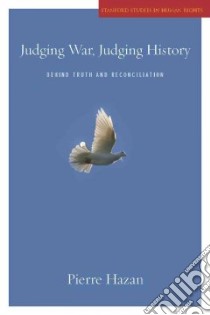Judging War, Judging History - 9780804769563
Un libro in lingua di Pierre Hazan Meyer De Stadelhofen Sarah (TRN) edito da Stanford Univ Pr, 2010
- € 18.50
- Il prezzo è variabile in funzione del cambio della valuta d’origine
"Few people have analyzed as thoughtfully as Pierre Hazan the potential conflicts between peace and justice, and the tensions between righting the wrongs of the past and assuring harmony in the present. Skeptical and inquisitive, Hazan goes beyond cliches and dogmas to explore the rise---and the limits---of international law in resolving historical injustices."---Reed Brody, Human Rights Watch
"From the trauma of the first Durban conference on racism to the ambivalence of Africa vis-a-vis the International Criminal Court, Pierre Hazan examines brilliantly the marketplace of grievances, justice, memory, and vindication. A beautifully written book, intellectually challenging, honest, and hard-hitting."---Louise Arbour, President and CEO, International Crisis Group; Former UN High-Commissioner for Human Rights; Former Prosecutor of the International Criminal Tribunals for Former Yugoslavia and for Rwanda
"Pierre Hazan, in a brilliant and erudite book beautifully written, analyzes the fascinating account of the judicial and cultural revolution that started after the end of the Cold War."---Le Monde Diplomatique
In a country or community fractured by war and mass violence, who is to determine "justice" and how it should be achieved? Truth commissions, international courts, and financial restitution are some of the various solutions that have been used in recent years. However, these broad efforts at transitional justice may themselves backfire, and sometimes lead to further injustice. Given its own limitations and battered by political pressure from all sides, transitional justice is an imperfect solution. Yet as Pierre Hazan contends in his new book, it constitutes our best hope for liberation from a cycle of violence begetting vengeance and more violence.
Judging War, Judging History takes a hard look at the growing use and influence of truth and reconciliation commissions and the increasing importance of transitional justice in contemporary conflict resolution. From the Nuremberg Trials to current-day conflicts in South Africa, Morocco, and Uganda, Pierre Hazan reveals the extent to which the approaches intended to commemorate events and mend societies after acts of war and violence ultimately intensify the huge task of dealing with victims' claims for recognition. This compelling book uncovers the tensions created by these new reconciliation policies and shows how changing ideas about and approaches to justice influence not only our understanding of the past but also our contemporary social and political choices.
Informazioni bibliografiche
- Titolo del Libro in lingua: Judging War, Judging History
- Sottotitolo: Behind the Truth and Reconciliation
- Lingua: English
- Autori : Pierre Hazan Meyer De Stadelhofen Sarah (TRN)
- Editore: Stanford Univ Pr
- Collana: Stanford Univ Pr (Paperback)
- Data di Pubblicazione: 21 Maggio '10
- Genere: SOCIAL SCIENCE
- Argomenti : Transitional justice Human rights International criminal courts
- Pagine: 222
- ISBN-10: 0804769567
- EAN-13: 9780804769563


